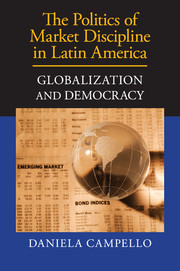Book contents
- Frontmatter
- Dedication
- Contents
- List of Illustrations
- List of Tables
- Acknowledgments
- 1 Globalization, Democracy, and Market Discipline
- 2 Between Votes and Capital: Redistribution and Uncertainty in Unequal Democracies
- 3 Investors' “Vote” in Presidential Elections
- 4 The Politics of Currency Booms and Crises: Explaining the Influence of Investors' “Vote”
- 5 Currency Crisis, Policy Switch, and Ideological Convergence in Brazil
- 6 Exogenous Shocks and Investors' Political Clout in Ecuador
- 7 One President, Different Scenarios: Crisis, Boom, and Market Discipline in Venezuela
- 8 “Vivir con Lo Nuestro”: Default and Market Discipline in Argentina
- 9 Who Governs? Market Discipline in the Developed World
- 10 Conclusion: Markets' Vote and Democratic Politics
- References
- Index
6 - Exogenous Shocks and Investors' Political Clout in Ecuador
Published online by Cambridge University Press: 05 April 2015
- Frontmatter
- Dedication
- Contents
- List of Illustrations
- List of Tables
- Acknowledgments
- 1 Globalization, Democracy, and Market Discipline
- 2 Between Votes and Capital: Redistribution and Uncertainty in Unequal Democracies
- 3 Investors' “Vote” in Presidential Elections
- 4 The Politics of Currency Booms and Crises: Explaining the Influence of Investors' “Vote”
- 5 Currency Crisis, Policy Switch, and Ideological Convergence in Brazil
- 6 Exogenous Shocks and Investors' Political Clout in Ecuador
- 7 One President, Different Scenarios: Crisis, Boom, and Market Discipline in Venezuela
- 8 “Vivir con Lo Nuestro”: Default and Market Discipline in Argentina
- 9 Who Governs? Market Discipline in the Developed World
- 10 Conclusion: Markets' Vote and Democratic Politics
- References
- Index
Summary
The previous chapter unveiled how financial market panic, caused by the anticipation of Lula da Silva's electoral victory, influenced the appointment of his government's economic team and the agenda pursued in office in unexpected ways.
Most importantly, I have shown that even though market discipline was the strongest during the campaign and in the first year in office, when Brazil was subject to severe currency pressures, its effects remained visible even after international conditions improved and the government's external financing needs decreased. As a result, since 2002 the country has experienced a convergence of Left and Right around orthodox economic policymaking similar to that predicted by efficiency theories of globalization.
This chapter examines the presidencies of the leftists Lucio Gutiérrez and Rafael Correa, elected in 2002 and 2006 in Ecuador, and explains why market discipline did not produce a similar long-term convergence in the country. Four years after Gutiérrez switched to an orthodox program in response to a confidence crisis, Correa campaigned and governed on a leftist economic agenda, and responded to market panic by telling investors to “take a Valium.”
I argue that these diverging behaviors cannot be understood without reference to the external scenario endured by each president, which determined governments' dependence on international sources of finance and in turn markets' leverage to influence policymaking.
Lucio Gutiérrez was inaugurated under severe currency pressures, precipitated by a sharp decrease in oil prices, the country's top export product, in addition to financial markets' risk averse behavior in the aftermath of the Argentine default and of what was perceived as a Latin American “leftist wave.”
In an attempt to avoid the financial collapse that could be potentially caused by a substantial loss of international reserves in a dollarized economy, Gutiéerrez renounced his campaign promises, and advanced an investor-friendly program explicitly aimed at attracting foreign financial capital to the economy.
The limited power in the hands of the executive that characterized the Ecuadorean presidency, on top of long-increasing levels of political instability and party system fragmentation (Pachano 2005), contributed to Gutiérrez's switch by forcing him to gather political support from conservative parties.
- Type
- Chapter
- Information
- The Politics of Market Discipline in Latin AmericaGlobalization and Democracy, pp. 118 - 135Publisher: Cambridge University PressPrint publication year: 2015

